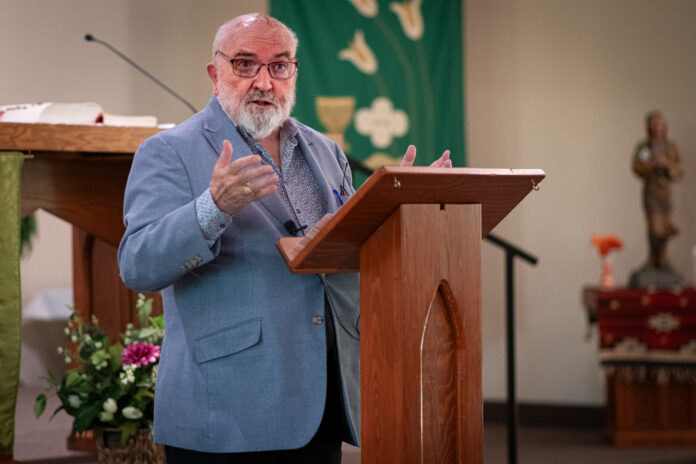
Former president of St. Thomas University Michael Higgins delivered a talk during the launch of his newest book, The Jesuit Disruptor: A Personal Portrait of Pope Francis.
On Sept. 14, at Holy Family Church, Higgins talked about the Synod and Synodality, which is an assembly of religious leaders that discusses global topics.
During his talk, Higgins captured the attention of an audience of about 80 people. He shared his knowledge on themes ranging from his days as an English and religious studies professor to how technology has become the epicentre for young people.
Higgins elaborated in his book that as a teenager, he became obsessed with any text that included popes and their history.
“Kingdoms, regimes and governments come and go, but the popes will always be there,” wrote Higgins.
Higgins was also a columnist for the Xaverian while at St. Francis Xavier University, where he frequently wrote about the Popes. This interest continues to this day.
Higgins has attended three synods and is off to the fourth one in Rome in October to cover it as a journalist.
Since leaving STU in 2009, he has worked as a commentator, columnist, and documentarian for newspapers across Canada. He was also vice president at Sacred Heart University in Connecticut for ten years.
When faced with the pandemic, Higgins said one of the biggest challenges was helping students find their identity and clarity within society. The students’ friends were on social media rather than face-to-face.
“We had all these people on campus and they were the loneliest they had ever been,” he said. “You need to be with community, you need to embrace people, you need to hold each other.”
During his talk he said Pope Francis has attempted to address this current generation’s fracture with the rest of the world. At the same time, he said he understands the root of this problem to a psychological level.
“We have not been especially careful in cultivating and maintaining a catechesis or awareness with the young,” Higgins said.
Higgins said during his talk prioritizing young people and engaging them in face-to-face connections within their communities is essential for developing the art of dialoguing.
The former STU president also mentioned how regenerating hope during crises is a sign of authentic leadership.
Higgins emphasized that we need more personnel who work with developing youth and future leaders.
“You need the personnel; personnel are policy,” he said.
